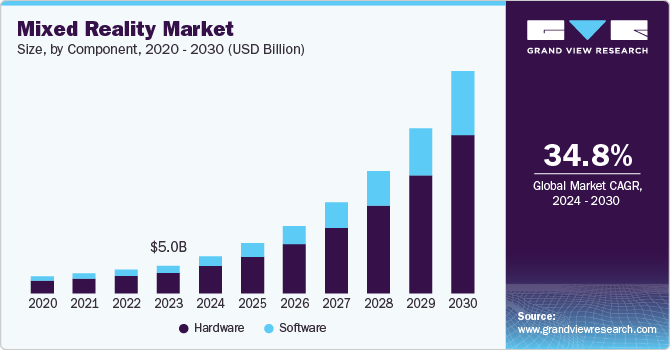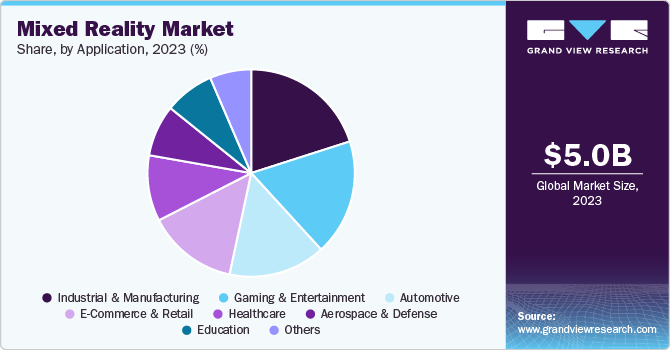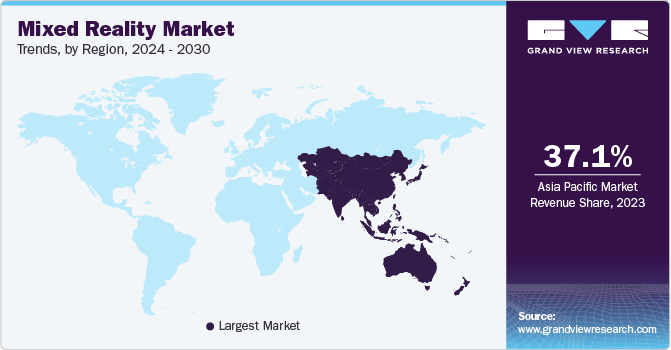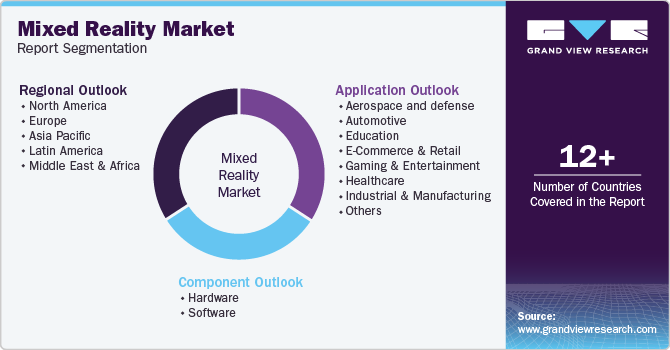- Home
- »
- Next Generation Technologies
- »
-
Mixed Reality Market Size & Share, Industry Report, 2030GVR Report cover
![Mixed Reality Market Size, Share & Trends Report]()
Mixed Reality Market (2024 - 2030) Size, Share & Trends Analysis Report By Component (Hardware, Software), By Application (Aerospace & Defense, Education, E-Commerce & Retail, Gaming & Entertainment, Healthcare, Others), By Region, And Segment Forecasts
- Report ID: GVR-1-68038-173-3
- Number of Report Pages: 100
- Format: PDF
- Historical Range: 2018 - 2022
- Forecast Period: 2024 - 2030
- Industry: Technology
- Report Summary
- Table of Contents
- Segmentation
- Methodology
- Download FREE Sample
-
Download Sample Report
Mixed Reality Market Summary
The global mixed reality market size was valued at USD 5.03 billion in 2023 and is projected to reach USD 40.58 billion by 2030, growing at a CAGR of 34.8% from 2024 to 2030. The advancements in hardware and software technologies are continuously pushing for the widespread use of mixed reality. Mixed reality combines virtual reality features with the real world, making it attractive to various users.
Key Market Trends & Insights
- The Asia Pacific Mixed Reality market dominated the global market with a revenue share of 37.1% in 2023.
- The U.S. secure access service edge market dominated the regional market in 2024.
- Based on offerings, the platform segment dominated the market with a revenue share of 68.8% in 2024.
- Based on application, the IT & telecom segment dominated the market with the largest share in 2024.
Market Size & Forecast
- 2023 Market Size: USD 5.03 Billion
- 2030 Projected Market Size: USD 40.58 Billion
- CAGR (2024-2030): 34.8%
- Asia Pacific: Largest market in 2024
Consumers and businesses are both gaining immersive experiences from mixed reality. Major companies are investing in the research and development of the mixed reality market, which leads to the innovation of this market. Mixed reality is utilized in the educational field to enhance learning experiences. These are key driving factors contributing to the expansion of the mixed reality market.

The growing utilization of Mixed Reality (MR) in different sectors further propels market expansion. Mixed reality transforms healthcare, manufacturing, and aerospace operations by offering real-time data, enhancing collaborations, and improving productivity. For instance, surgeons can use mixed reality to view patient information and conduct intricate procedures with improved accuracy. Engineers may use mixed reality techniques to enhance product design and prototyping effectively.
The advancements in hardware technologies and mobile software are the major drivers of the market. These advancements increase the overall user experience and create a deeply engaging environment. Additionally, the expanding variety of advanced wearable gadgets can enhance human interaction with the world by increasing engagement and authenticity. The adoption of these wearable technologies is increasing market growth. Healthcare professionals highly adopt mixed reality as MR allows them to visualize complex anatomical structures with the utmost clarity. Furthermore, youth use mixed reality for entertainment and gaming. MR offers an astonishing blend of the real world and digital elements. Mixed reality combines virtual and augmented reality, giving users an immersive experience.
Components Insights
The hardware component dominated the market and accounted for a revenue share of 73.6% in 2023. The hardware segment of mixed reality includes devices such as head-mounted displays (HMDs), cameras, sensors, and processors. Additionally, the growing demand for high-quality audio and visual experiences and the need for advanced sensors and tracking systems have propelled hardware development. Moreover, integrating augmented reality and virtual reality features in a single device, driven by consumer demand for versatile solutions, has significantly contributed to the hardware segment growth.
The software component is expected to register the fastest CAGR during the forecast period. The growing complexity of mixed reality experiences requires advanced software platforms for creating content, developing applications, and managing user interactions. Furthermore, the increasing demand for immersive and interactive applications in various sectors fuels the development of customized software solutions. Moreover, progress in artificial intelligence and machine learning allows for the development of smart virtual agents and enhanced analytical capabilities, which drive further growth of the software segment. Moreover, the growing network of mixed reality devices and platforms requires compatible software to ensure smooth user interactions, contributing to driving the segment’s rapid growth.
Application Insights
The industrial & manufacturing segment dominated the market in 2023. Mixed reality (MR) is revolutionizing the manufacturing industry by enhancing processes like design, prototyping, and inventory management through immersive experiences. This technology merges virtual and augmented reality, enabling companies to visualize equipment, optimize assembly lines, and create interactive prototypes, thus saving time and resources. Additionally, MR is instrumental in employee training, providing a safe environment for practicing tasks. It also facilitates remote location connectivity and real-time data visualization on machinery, empowering quick and informed decision-making. This innovative approach encourages creativity and efficiency across various manufacturing sectors.

The healthcare segment is projected to grow at the fastest CAGR over the forecast period.The surge in mixed reality (MR) in healthcare results from its ability to merge Virtual Reality (VR) and Augmented Reality (AR), enhancing interactive patient care. MR allows healthcare workers to consult remotely with specialists and access real-time patient data, including 3D MRI visualizations. This tech improves diagnostic accuracy, treatment planning, and surgical procedures, facilitating collaborative, real time work among global healthcare teams. Additionally, MR provides realistic training simulations for medical students, offering safe, hands-on practice with surgeries and patient interactions, thus elevating both educational outcomes and patient care standards.
Regional Insights
North America mixed reality market accounted for a significant revenue share in 2023. The region has a strong technological infrastructure, focusing on research and development to promote innovation in mixed reality hardware and software. Furthermore, the participation of tech giants such as Apple, Meta, and Microsoft have driven substantial investments and progress in the industry. Moreover, the entertainment, gaming, and aerospace sectors, which are significant users of mixed reality solutions, are well-established in North America, leading to a need for cutting-edge products and services. The region's strong economy and high disposable income levels have also significantly expanded the mixed reality market, with consumers willing to spend on high-quality devices and experiences.
U.S. Mixed Reality Market Trends
The U.S. mixed reality market dominated North America with a significant share in 2023 due to robust technological infrastructure, early adoption of emerging technologies, and the presence of leading tech giants. Moreover, significant research and development investments and a thriving venture capital ecosystem have fueled innovation and product commercialization. The entertainment and gaming industries have embraced mixed reality as a platform for immersive experiences, driving consumer demand. Additionally, the U.S. military and aerospace sectors are actively exploring mixed reality applications for training, simulation, and maintenance, contributing to market growth.
Europe Mixed Reality Market Trends
Europe mixed reality market was identified as a lucrative region in 2023. The existence of well-developed automotive, aerospace, and manufacturing sectors has led to a high need for advanced training and simulation solutions, driving the adoption of mixed reality technologies. Moreover, the increasing emphasis on digital transformation in diverse industries such as healthcare, education, and retail has created new opportunities for mixed reality applications. The region's high disposable income and early adoption of digital technologies have also contributed to the market's growth.
The UK mixed reality market is expected to grow rapidly in the coming years. High disposable income, early adoption of digital technologies, and government support towards technological advancements contribute to market growth in the UK. Furthermore, the UK's focus on digital transformation in healthcare, education, and retail sectors also creates new opportunities for mixed reality applications.
Asia Pacific Mixed Reality Market Trends
The Asia Pacific mixed reality market is anticipated to grow at the fastest CAGR over the forecast period. The large and tech-savvy population and increasing disposable incomes drive the region’s strong consumer base for mixed reality devices and experiences. Additionally, substantial investments in research and development, especially in nations such as China and South Korea, have promoted technological advancements and accelerated product innovation. Furthermore, the growing gaming and entertainment sectors in Asia Pacific have adopted mixed reality to create immersive content, leading to increased consumer interest. Moreover, the increasing emphasis on industrial uses like manufacturing, education, and maintenance has increased the demand for mixed reality solutions in Asia Pacific.

China's mixed reality market is growing extensively due to China's large population, rising disposable income, and technological advancements, which have paved the way for its adoption. Furthermore, significant government support and investments in digital infrastructure have accelerated market growth. Moreover, the existence of tech giants and a strong network of startups has encouraged innovations, leading to growth in the market.
Key Mixed Reality Company Insights
Some of the key companies in the mixed reality market include Acer Inc., Google LLC, HTC Corporation, Magic Leap, Inc., Microsoft Corporation, and others. To obtain a competitive advantage in the industry, companies are concentrating on growing their customer base. As a result, important players are pursuing several calculated risks, including partnerships, mergers, and acquisitions with other big businesses.
-
Meta, previously known as Facebook, has become a key player in the growing mixed reality (MR) market. Meta envisions building the metaverse, a digital world where individuals can collaborate, engage in activities, and interact socially. The corporation has invested heavily in research and advancement of AR, VR, and MR technologies.
-
Google LLC (Google), a subsidiary of Alphabet Inc., provides search and advertising services. The company’s main business areas are advertising, search, Google Maps, Google Docs, Chrome, Google Photos, and various hardware products in mixed reality, virtual reality, and augmented reality markets.
Key Mixed Reality Companies:
The following are the leading companies in the mixed reality market. These companies collectively hold the largest market share and dictate industry trends.
- Acer Inc.
- Google LLC
- HTC Corporation
- Magic Leap, Inc.
- Microsoft
- Meta
- Samsung Electronics Company Limited.
- Hewlett Packard Enterprise Development LP
- Canon Inc.
- Dell Inc.
- Varjo
- Seiko Epson Corporation
- Niantic.
Recent Developments
-
In April 2024, The Meta Horizon OS mixed reality operating system, which powers Meta Quest headsets, powered this new hardware ecosystem. Meta Horizon OS is a platform that centers on social presence by integrating a range of features with the fundamental technologies that drive modern mixed reality experiences.
-
In January 2024, the new chip from Qualcomm was used in augmented and virtual reality (VR and AR). Google LLC and Samsung Electronics Co. planned to incorporate Qualcomm Inc.'s (QCOM) new chip for virtual reality (VR) and augmented reality (AR) into their immersive experience technologies.
-
In June 2023, Meta's CEO, Mark Zuckerberg, unveiled the company's next-generation mixed-reality headset, the Quest 3. Mark Zuckerberg revealed that the headset would feature color-mixed reality by combining augmented and virtual reality, giving users an immersive visual experience.
Mixed Reality Market Report Scope
Report Attribute
Details
Market size value in 2024
USD 6.77 billion
Revenue forecast in 2030
USD 40.58 billion
Growth rate
CAGR of 34.8% from 2024 to 2030
Base year for estimation
2023
Historical data
2018 - 2022
Forecast period
2024 - 2030
Report updated
January 2025
Quantitative units
Revenue in USD million and CAGR from 2024 to 2030
Report coverage
Revenue forecast, company ranking, competitive landscape, growth factors, and trends
Segments covered
Component, Application, and Region
Regional scope
North America, Europe, Asia Pacific, Latin America, MEA
Country scope
U.S., Canada, Mexico, Germany, UK, France, Italy, Spain, China, Japan, India, South Korea, Brazil, UAE, South Africa and Saudi Arabia
Key companies profiled
Acer Inc.;Google LLC;HTC Corporation; Magic Leap, Inc.; Microsoft; Meta; Samsung Electronics Company Limited; Hewlett Packard Enterprise Development LP; Canon Inc.; Dell Inc.; Varjo; Seiko Epson Corporation;Niantic.
Customization scope
Free report customization (equivalent up to 8 analysts working days) with purchase. Addition or alteration to country, regional & segment scope.
Pricing and purchase options
Avail customized purchase options to meet your exact research needs. Explore purchase options
Global Mixed Reality Market Report Segmentation
This report forecasts revenue growth at global, regional, and country levels and provides an analysis of the latest industry trends in each of the sub-segments from 2018 to 2030. For this study, Grand View Research has segmented the global mixed reality market report based on component, application, and region.

-
Component Outlook (Revenue, USD Million, 2018 - 2030)
-
Hardware
-
Software
-
-
Application Outlook (Revenue, USD Million, 2018 - 2030)
-
Aerospace and defense
-
Automotive
-
Education
-
E-Commerce & Retail
-
Gaming & Entertainment
-
Healthcare
-
Industrial & Manufacturing
-
Others
-
-
Regional Outlook (Revenue, USD Million, 2018 - 2030)
-
North America
-
U.S.
-
Canada
-
Mexico
-
-
Europe
-
Germany
-
UK
-
France
-
Italy
-
Spain
-
-
Asia Pacific
-
China
-
Japan
-
India
-
South Korea
-
-
Latin America
-
Brazil
-
-
Middle East and Africa (MEA)
-
UAE
-
South Africa
-
Saudi Arabia
-
-
Share this report with your colleague or friend.
Need a Tailored Report?
Customize this report to your needs — add regions, segments, or data points, with 20% free customization.

ISO 9001:2015 & 27001:2022 Certified
We are GDPR and CCPA compliant! Your transaction & personal information is safe and secure. For more details, please read our privacy policy.
Trusted market insights - try a free sample
See how our reports are structured and why industry leaders rely on Grand View Research. Get a free sample or ask us to tailor this report to your needs.










